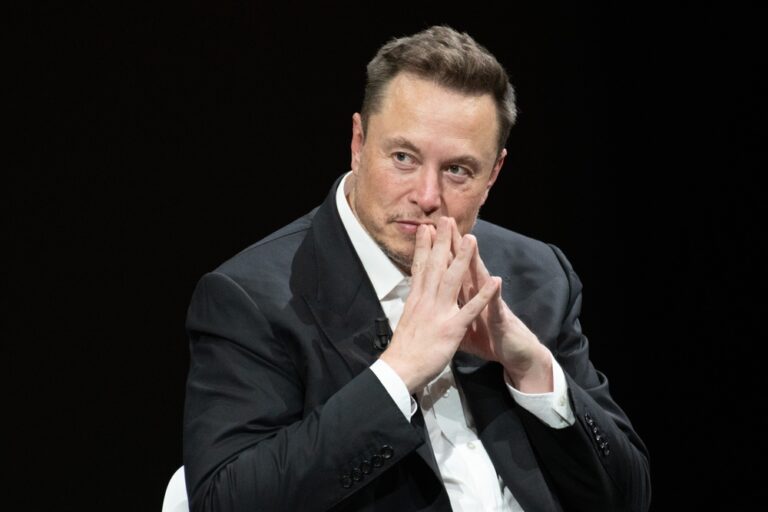Tesla shareholders have approved an extraordinary pay deal for Elon Musk that could reach nearly $1 trillion. The proposal, backed by 75% of voters at Thursday’s annual meeting, was met with loud cheers and applause.
Musk, already the world’s richest person, must significantly raise Tesla’s market value over the next decade to unlock the full payout. If he meets every target, he will receive hundreds of millions of new Tesla shares.
The deal has drawn sharp criticism, but Tesla’s board defended it, saying Musk’s leadership is essential and irreplaceable.
Celebration and bold promises in Austin
After the vote, Musk took the stage in Austin, Texas, dancing as the audience chanted his name. “We’re not just turning a page for Tesla,” he told the crowd. “We’re starting a whole new book.”
He added, “Other shareholder meetings are boring. Ours are legendary. Look at this excitement!”
To earn the full reward, Musk must increase Tesla’s market capitalization from $1.4 trillion to $8.5 trillion and launch one million self-driving Robotaxi vehicles into commercial operation.
Musk shifts focus toward humanoid robots
At the meeting, Musk spotlighted Tesla’s humanoid robot, Optimus, rather than its electric car business. The move surprised analysts who wanted news on Tesla’s vehicle lineup and production strategy.
“Let it sink in where Musk’s attention is,” wrote Gene Munster, managing partner at Deepwater Asset Management, on X. “His new vision begins with Optimus. Still no mention of cars, self-driving, or robotaxis.”
Later, Musk briefly mentioned Tesla’s full self-driving software, saying the company was “almost comfortable” allowing drivers to “text and drive essentially.”
Regulators investigate Tesla’s self-driving system
US regulators continue to probe Tesla’s self-driving feature after multiple reports of cars running red lights or driving on the wrong side of the road. Several incidents have led to crashes and injuries.
Despite the controversy, Tesla’s stock rose slightly in after-hours trading and has gained more than 60% over the past six months.
Politics and public perception weigh on Tesla
Tesla’s sales have dropped during the past year following Musk’s public support for former US President Donald Trump. Their relationship later collapsed, creating more turbulence for the company’s image.
Investor Ross Gerber, CEO of Gerber Kawasaki, described Musk’s compensation deal as “another unbelievable moment in business history.” He said Tesla faces serious challenges despite Musk’s ambitious plans.
Gerber doubted the demand for humanoid robots and highlighted growing competition in the robotaxi sector from rivals like Waymo.
He said his firm reduced its Tesla holdings, arguing that “Musk’s polarising image has damaged the brand. Elon seems unaware of how unpopular he has become.”
Analysts reaffirm Musk’s importance to Tesla
Dan Ives, a technology analyst at Wedbush Securities, called Musk “Tesla’s biggest asset.” In a note after the vote, he said, “Tesla’s AI-driven valuation is now beginning to unfold. The company’s next growth chapter has started.”
Musk already owns around 13% of Tesla’s shares. Shareholders had previously approved a multibillion-dollar pay package tied to a tenfold increase in the company’s value — a goal Musk achieved.
Legal battles and corporate relocation to Texas
A Delaware judge struck down that earlier pay plan, saying Tesla’s board was too close to Musk. Tesla later shifted its corporate registration to Texas. The Delaware Supreme Court is now reviewing the lower court’s decision.
The new deal faced opposition from major institutional investors, including Norway’s sovereign wealth fund and the California Public Employees’ Retirement System, the largest US public pension fund.
Because large funds rejected the plan, Musk relied heavily on Tesla’s large base of retail investors to secure approval.
Tesla board leads major campaign to support Musk
Musk and his brother Kimbal, who also sits on Tesla’s board, were both eligible to vote at Thursday’s meeting. In the weeks before the vote, Tesla’s directors launched an aggressive campaign to rally support for the deal.
A promotional video on votetesla.com featured board chair Robyn Denholm and director Kathleen Wilson-Thompson praising Musk’s leadership and long-term vision. The campaign drew criticism from governance experts who said it blurred the line between corporate messaging and shareholder lobbying.


